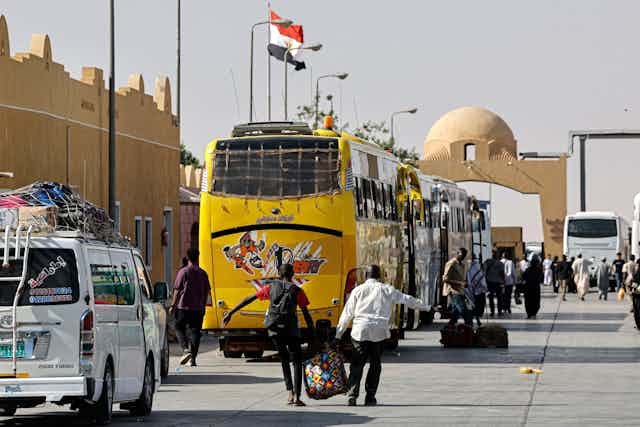Hostilities between rival military parties in Sudan had claimed more than 600 lives by May 2023.
The infighting has mostly been between the Sudanese Armed Forces loyal to Abdel Fattah al-Burhan, Sudan’s current military ruler, and the Rapid Support Forces, a paramilitary force led by his deputy Mohamed Hamdan Dagalo, “Hemedti”.
Sudan and Nigeria have regional and geographical connections, especially through Chad, which is a neighbour to both.
As I have previously noted, the fallout of the crisis in the Lake Chad Basin region, of which Nigeria is a core member, directly affects the country’s peace and security.
Nigeria is duty bound to respond to the unfolding situation, considering the 5,500 Nigerian nationals and the over 5 million Sudanese of Nigerian origin in Sudan.
Aside from helping the Nigerians trapped in Sudan, Nigeria needs to offer relief and assistance because a spiralling Sudan will have an impact on Nigeria’s own peace.
As an international security expert with a regional focus on west Africa, I argue that without Nigeria’s input, the prospects of lasting peace in Sudan remain elusive, as no other country in Africa has what it takes to fill this role.
Sudan could experience a prolonged conflict that the sub-region cannot afford to manage. The situation in Sudan offers Nigeria an opportunity to reassert a leadership role. Nigeria also has the legitimacy and recognition to take the lead on providing an African solution to an African problem.
Nigeria’s regional role
Nigeria dominates the west African sub-region. It has the largest population in Africa at over 213 million people, and the largest economy by gross domestic product at US$440.8 billion as of 2021.
With an estimated total military personnel of 215,000, of which 135,000 are active, Nigeria has the most formidable military force in west Africa.
A recurring argument is that given Nigeria’s current economic woes, which include a rising debt profile, it may not be able to take the leadership role. If it doesn’t, who will, and what would the implications be?
A history of interventions
Nigeria has a record of intervening to achieve stability in west Africa. It did this during the first (1989-1996) and second (1999-2003) Liberian civil wars, and Sierra Leone’s civil war (1991-2002). In both cases, Nigeria played a leading role in restoring peace and security.
Nigeria’s decision at the time reflected a willingness to avert a regional humanitarian crisis and the potential spillover effects of armed conflicts.
Nigeria has also helped to sustain democratic rule in west Africa. A case in point was Cote d’Ivoire, where after a disputed election, Laurent Gbagbo refused to hand over power to Alassane Ouattara.
In 2016, following Yahyah Jammeh’s refusal to relinquish political power in The Gambia, Nigeria mobilised regional support. This regional intervention led to the emergence of Adama Barrow as president. Nigeria also contributed to the 4,000 troops who remained in The Gambia.
In July 2022, Nigeria waded in on the crisis between Mali and Cote d’Ivoire over detained soldiers.
Sudan’s impact on Nigeria
The situation in Sudan has already led to a worsening humanitarian crisis in the region. The UN refugee agency recently noted that 55,000 people have fled from Sudan to Chad.
With a 1,300km border between Sudan and Chad, the unfolding situation could lead to an influx of small and light arms and displaced people, which could worsen the situation in the Lake Chad Basin and the Sahel regions.
For Nigeria, this would mean increased pressure on infrastructural facilities arising from the arrival of refugees.
There is also the possibility of an upswing in violence if foreign terrorist fighters from across the Sahel region seek new recruits and safe havens.
For Nigeria, this would be one trouble too many. The country’s security forces have been stretched responding to multiple security threats at home.
What Nigeria should do
Mediation: the United States is attempting to play the role of a mediator but the chances of it brokering a peace deal are slim.
Citizens in west African states like Mali and Burkina Faso see the west, including France, as part of the problem rather than the solution.
A state-led mediation effort from an African regional power like Nigeria offers a better chance at acceptability and recognition. It avoids the suspicion that comes with the involvement of western powers.
Nigeria should send a special envoy to Sudan and rally continental efforts through the African Union.
Effective manning of entry points: Nigeria needs to guard potential illegal entry points and use aerial surveillance.
Nigeria’s Immigration Service and its National Identity Management Centre must also be ready for rapid documentation of foreign nationals finding their way into the country.
Refugee management: emergency refugee camps will be needed to accommodate refugees from the war in Sudan.
Provision of relief materials: the Nigerian Air Force should be willing to airlift medical and relief materials into Sudan. Nigeria’s vast experience in this regard would make a difference on the ground.
Way forward
As a regional leader, Nigeria must not sit by at a time of turbulence such as this.
Doing so widens the existing “policing gap” across the region, especially since France’s exit from Mali.
Nigeria’s foreign policy actions and inaction will be closely watched. The unfolding situation in Sudan reinforces the need for Nigeria to come up with an articulate grand strategy that reflects its position and national interests in a complex and fast-changing region.

